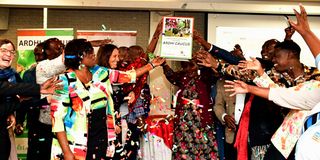Ardhisasa: What every woman needs to know about the digital land records platform

Delegates during the launch of Ardhi Caucus Strategy at Jacaranda Hotel, Westlands, Nairobi, on July 19, 2024.
What you need to know:
- Although it's currently only in use in Nairobi and Murang'a counties, the Lands ministry is working to expand it to the rest of the counties.
- Daniel Sakwa explains that they feed the platform with information from paper-based land records after thorough verification.
The Ministry of Land has an online platform where Kenyans can access land-related information. Ardhisasa allows landowners and buyers to search land, transfer ownership, order a development plan and title deed.
Although it's currently only in use in Nairobi and Murang'a counties, the Lands ministry is working to expand it to the rest of the counties.
Here's what women need to know.
Daniel Sakwa, the deputy director for National Land Information Management System, explains that they feed the platform with information from paper-based land records after thorough verification.
“We don't change anything or introduce new information. We only transfer the information from the (manual) records into the digital format for easy retrieval,” he affirms.
Based on Mr Sakwa's explanation, it means that if a husband has excluded his wife from the title deed before the details are uploaded to the digital platform, she would remain unaware if the land they live on is sold. The system can only notify individuals whose names are on the title. In such a situation, a wife would have to resort to legal action if her husband sells the land without her knowledge.
However, in cases the land is co-owned, that information is captured in the system and whenever there is an attempt to conduct a search on it, a prerequisite to buying land, the co-owners receive a notification. It prompts them to approve the search.
“But that notification can only be sent to the person who is included in the records as the legal owner. If a woman is excluded, yet she co-owns the land, then, unfortunately, there is nothing the system can do,” notes Mr Sakwa.
The system also fails to capture all the wives in a polygamous marriage where their husband identifies them as his dependants, an inadequacy the Kenya Land Alliance wants addressed.
Mr Sakwa gave assurance that the system is a work in progress and issues raised will be addressed.
“In Murang'a, for instance, we have a customer care desk where those who need assistance with interacting with the system can be assisted,” he says.
An analysis from the Kenya Demographic and Health Survey (2022) shows that at the time of the study, 75 per cent of women did not own agricultural land, yet the majority of (75 per cent) of farm workers are women, according to the International Labour Organisation. Neither did 93 per cent of them possess non-agricultural land.





